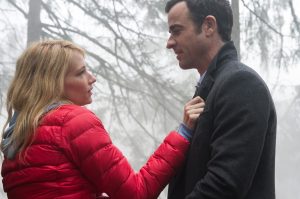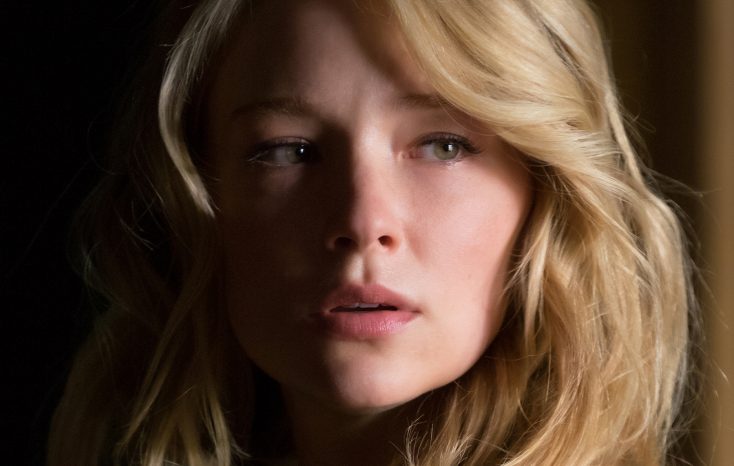
Megan (HALEY BENNETT) and Tom (JUSTIN THEROUX) in DreamWorks Pictures’ THE GIRL ON A TRAIN. ©Storyteller Distribution Co. CR: Barry Wetcher.
By ANGELA DAWSON
Front Row Features
HOLLYWOOD—Haley Bennett may not be a household name, but that may change soon as the talented young actress is fast becoming Hollywood’s new “It” girl.
The blond beauty co-stars alongside Denzel Washington and Chris Pratt in the box office hit “The Magnificent Seven.” She also plays a 1950s ingénue in Warren Beatty’s long-gestating Howard Hughes biopic “Rules Don’t Apply,” due out next month. She also stars as an object of fascination in the highly anticipated big screen adaptation of “The Girl on the Train.” Most audiences may recall her as the prissy pop star that sings Hugh Grant and Drew Barrymore’s catchy tune in “Music & Lyrics.”
Reached by phone in New York where she is promoting “The Girl on the Train,” Bennett is polite and direct in her responses about the film, directed by Tate Taylor and written for the screen by Erin Cressida Wilson. British author Paula Hawkins wrote the novel, which became a New York Times bestseller in 2015.
Bennett, 28, plays Megan Hipwell, a beautiful, mysterious woman who seems to have it all from the viewpoint of Rachel Watson, a divorced alcoholic passenger aboard a commuter train. Rachel (played by Emily Blunt, “Young Victoria”) imagines the idyllic world that the woman she sees every day on the balcony of a tony suburban home with her handsome, probably very rich husband. Megan just happens to live a couple of doors down from where Rachel used to live with her husband. That is, until he ditched her for Anna (Rebecca Hall), a beautiful real estate agent, with whom he now has a baby. As the story chugs along, viewers discover more about each of the women and how each of them are dealing with their own issues. Luke Evans, Justin Theroux and Edgar Ramirez also star.
While on the train one day, Rachel spies Megan with a man she is certain is not her husband engaging in a dalliance on her balcony. She decides to investigate. Later, Rachel turns up at her rented room bloodied and battered with almost no recollection of what has happened. A murder makes her a prime suspect but uncertainty surrounds the case, as clues are uncovered.
Q: There’s a lot of anticipation for screen version of “The Girl on the Train.” Are you hopeful that it will please die-hard fans of the novel?
Bennett: I have no doubts that the audience will be pleased.
Q: “The Magnificent Seven” was such a male-dominant film while this film’s central characters are female. Did that make a difference when you were on the sets of each?
Bennett: The films themselves have a distinct contrast between male-centric and female-centric. It’s interesting that the contrast is so extreme, in a way. For me, the reason I was attracted to reading (“The Girl on the Train”) was a matter of the portrayal of three women, all flawed, all experiencing grief from different degrees. That’s what drew me in. I was actually filming “Magnificent Seven” when I read (“The Girl on the Train”) for the first time. I had no knowledge that it was going to be made into a film and I didn’t know it was such a phenomenon. My reaction is comparative to the reaction of the world. I couldn’t put down the book when I read it the first time. It was a real page-turner; I finished it in two days.
Q: When you were reading the novel, did you imagine yourself playing Megan or any of the other characters?
Bennett: No. I didn’t read it with the intention of getting to know Megan.
Q: When you were contacted about playing Megan, was it intriguing the idea of playing her?
Bennett: What was intriguing to me was the fact that Tate Taylor was helming this project. I knew that in his hands, it could be something very interesting, something beyond just your average thriller.
Q: Did you get to hang around with the other actresses much?
Bennett: The irony of my desire to read the book because of the position of the three females was that when I finally got to set I didn’t work with any of the other actresses. My scenes are primarily with Luke (Evans) and Justin (Theroux).
Q: A few of your scenes are from a distance where the camera is far away and it’s simply you and Justin, Luke or Edgar interacting. Did that change how you delivered your performance?
Bennett: No. Because I think the story is told from the perspective of three women. You do see things up close and personal and you see them from far away. You see different situations from different perspectives. Those scenes were just necessary—those scenes from afar, because it’s about voyeurism and it’s about our need to peer into the lives of other people.
Q: Do you think the public is a little too obsessed with voyeurism? Are you concerned as a public figure?
Bennett: No, I just think it’s the nature of our world. People have found a way to hone in on it. The strange thing about it is that people want to be watched. It’s not like your traditional voyeurism where somebody’s watching you unbeknownst to you. You’re allowing people to peer into your life.
Q: In your travels for work or pleasure, have you been on a train and wondered about some of the people you see from the window?
Bennett: Part of the reason I love traveling by subway is the people-watching. I love the subway in New York City because I want to just observe. As an actor, it’s one of my favorite things to do: to observe other people—not in a creepy way.
Q: Is there one experience that stands out to you?
Bennett: Hmm. New York City is such a vibrant city and you when you’re on the train or just walking around, you catch parts of conversations and they cause you to perk up. I was walking down the street the other day when someone was in an argument and there was something about that made you want to be part of someone else’s drama. You want to compare your life to that of others and experience how they relate with each other. It’s not just me. Everybody else was stopping and looking. People love the drama.
Q: You also have another film coming out, “Rules Don’t Apply,” with Warren Beatty, which has been in the works for a while.
Bennett: Eighteen years.
Q: Are you excited about it coming out and what was it like working with Warren Beatty?
Bennett: The film is an ensemble piece and being on set was extraordinary. It was such a privilege to work with him. He’s a living legend and such an interesting human being. To be directed by him was a dream come true.
Q: Did you get the sense that this film was extremely important to him?
Bennett: Yeah. He approached it the same way he would have approached it 18 years ago had he had the opportunity. It probably was on his terms the reason he hadn’t made the film. It was just the right time.
Q: What can you tell me about your character in it?
Bennett: I sing in it. It’s set in the ‘50s and I play a young woman who is on contract with (mogul) Howard Hughes. It’s just a part of the structure of Hollywood back then. Women were required to not just act but also sing and dance. They were multitalented. The song is like a show tune number.
Q: You began your film career singing in 2007’s “Music & Lyrics.” Does singing remain a passion of yours? Do you plan to make an album at some point?
Bennett: Oh no! I did a film called “A Kind of Murder,” which comes out in December where I also had the opportunity to sing in that. It was a great song called “I Can’t Escape from You,” which was a Carmen McRae song.
Q: You recently presented Jimmy Fallon with a pie you made when you were a guest on “The Tonight Show.” And you also made a pie to your director when you met with him. What is it about you and pies?
Bennett: Baking, for me, is meditative.
Q: Have you always been passionate about cooking?
Bennett: I wouldn’t say that. I grew up with a single dad. All he taught me to make was sausage and beans.





